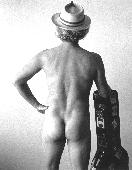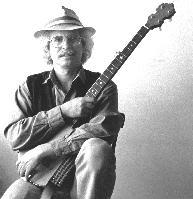About
About
Welcome
Hi, Bob here. Welcome to my re-designed webpage. The first version went up something over 25 years ago. High time for a make-over... (Read more)
Bob's One Minute Bio
I was born in Toronto in 1946 and raised there. My mother was an artist and my dad was... (Read more)
Bob's Wikipedia Bio
https://en.wikipedia.org/wiki/Bob_Bossin
Bob On His Songs
Songs are like your children, you love them all in different ways. Daddy Was a Ballplayer... (Read more)
Bob's Obituary - Way back in December 1995, the Canadian Folk Music Bulletin published a retrospective interview on my life and times in folk music called "That's what folk songs have always done....". I call it "My Obituary"... (Read more)
Interview in The Jewish Independent, June 2017.
"For legendary Canadian folksinger Bob Bossin... it all started with 'The King.'" (Read more)
Welcome
Hi, Bob here. Welcome to my re-designed web page. The first version went up something over 25 years ago. High time for a make-over. On the other hand, I’m surprised how well this stuff stands up. The original introduction, for instance. Here it is, only slightly amended.
1994 Welcome
As the story goes, somebody once asked Woody Guthrie how you get to be a musician. "Easy," said Woody. "Throw your hat on the road, lean your ass against a post and start practising. When someone drops a dime in the hat, you're a musician."
By that measure, I've been a folksinger over 50 years. Along the way, I've learned some neat tricks, like how to raise $25,000 to make a CD. I've played some unlikely places, like the University of Inner Mongolia at Hohhot (and the Concordia Business School in Montreal). I’ve met some unlikely people, like the Innu woman who came up after a concert in Aklavik, NWT and asked if her daughter could touch me to prove that I was really there and not on TV.
This web site is about all that – both what I have done, and what I have learned. Under "By Bob", for instance, you will find tips on how to put on a house concert that would make Martha Stewart proud; and how to raise money for a CD or whatever. (Some say I invented crowd-funding and they aren’t entirely wrong).There is the story of how a few of us used a shoestring music video to save the Clayoquot rainforest.
I will, I promise, try to be better about updating this site. I welcome your comments and suggestions. Click here to send me a message. If you find this web site helpful or entertaining, please mention it to friends. Thanks for dropping by.
Bob Bossin
Gabriola Island
XXX, 2016
Bob's One-Minute Bio
I was born in Toronto in 1946 and raised there. My mother was an artist (see Marci) and my dad was, well, see Davy the Punk. I went to the University of Toronto at the height of the sixties, then Rochdale College. I actually have a Rochdale College PhD (it's a long story).
In 1971 Marie-Lynn Hammond and I founded Stringband. We toured for the next 15 years (See Whatever Happened to Stringband?). Then, in the late 80s, I formulated Bossin's Home Remedy for Nuclear War. The medicine show toured Canada, the US, Australia and New Zealand, selling some 9000 bottles of the stuff.
In 1991, I moved to Gabriola Island; in 1992, I married Mary Jo Fulmer; in 1993, Madelyn (aka Gee) was born; in 1999, Davy was. In 2004 Mary Jo moved back to town.
In 1994, I released GABRIOLA V0R1X0. As well, Nettie Wild directed Sulphur Passage, a music video/ mini-documentary set to my song about the Clayoquot forest protests. It won a half-dozen international awards and, more importantly, played a significant role in the fight to preserve Clayoquot wilderness. (See How I saved Clayoquot.)
In 2003, The Indispensable Stringband, a retrospective box set of Stringband's music, was released. In 2005, I recorded The Roses on Annie's Table. That year I met Sima Elizabeth Shefrin. We have been partners ever since, marrying in 2012. Elizabeth illustrated my little book Latkes.
From 2006 to 2014 I researched and wrote Davy the Punk, my book about my dad. It was published by The Porcupine’s Quill in 2014. As well I wrote a musical version of “Davy” that I have been performing on stage ever since.
That’s about it.
Bob recalls his songs
This is also from the 1995 interview I call "My Obituary." I had not yet written the songs that became The Roses on Annie’s Table, so I don’t mention "Lily", "Curve Ball", or "Shirley Ann", three of my very favourites. Nor did I know at the time how significant a role "Sulphur Passage" would play in saving Clayoquot Sound. (See How I saved Clayoquot.)

BB - Songs are like your children, you love them all in different ways. "Daddy Was a Ballplayer" has a special place, because it was the first one I wrote that had its own voice, that didn't really sound like anyone else. "The Maple Leaf Dog" is another like that: no one else would ever have written that song. They were also songs that people responded to. They played a role in Stringband's little history.
On the other hand, I've also always had a warm spot for "Look What's Become of Me", in part because it wasn’t as popular.
I am proud of the compactness of expression in some of the songs: "Newfoundlanders", "Tugboats", "Dief", "The Casca and the Whitehorse Burned Down". I like the way they paint their picture with such simple-seeming strokes; then the meaning kind of radiates out from the song's little three-minute world. "Madelyn's Lullabye" is like that. There is really a lot going on in there, about family, about love, about social class, even though is a really simple song.
I like Ya Wanna Marry Me? because it is so much my own personal love song, although, ironically, it is also one of the most popular of my songs. Whenever it is played on radio I get calls and letters from people who want copies. I think they like that the song is both sweet and realistic about marriage - that rings a bell. Lunenburg Concerto was like that, too, personal as can be, and, because of that, personal to other people too.
Lunenburg and Satchel Paige are probably the richest, deepest, most emotionally complex ones.
And then I am really happy to have written political songs like Show Us the Length and Sulphur Passage. They have played their own small part in changing the world. Show Us the Length has literally been sung round the world, despite virtually no air-play (for reasons that are obvious if you know the song). Its success has been completely outside of the commercial stream. I am always hearing from people who heard it in some far-off place, who sang it themselves in some school show or at some protest. Someone sent me a tape of it being sung at a women's music festival - in Japanese!
Sulphur Passage is starting to have the same kind of non-commercial, hand-to-hand success. It really is playing a part in the struggle to save the forests, first in BC and now in lots of places. The video is so powerful, and it is being seen in different countries, in schools, at film festivals, at conferences. It brought tears to my eyes, the first time I saw it, and I know it affects a lot of people that way. It really seems to help people fight on.
